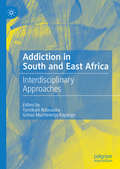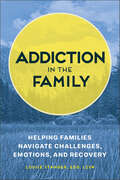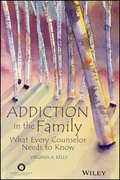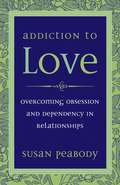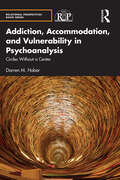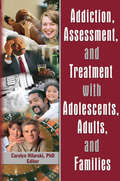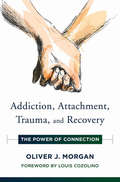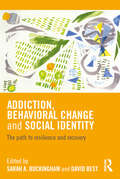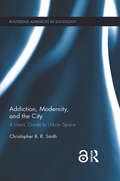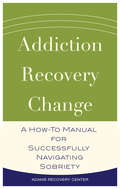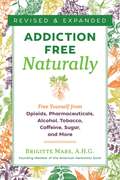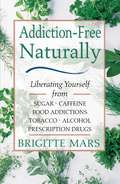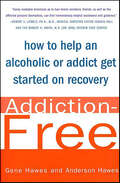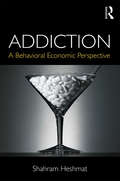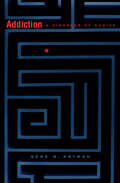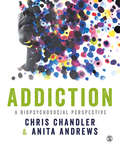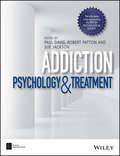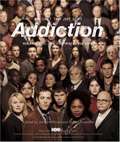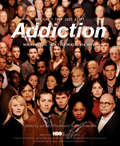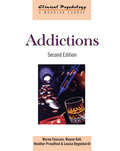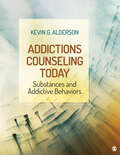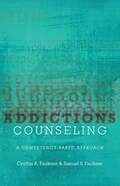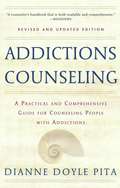- Table View
- List View
Addiction in South and East Africa: Interdisciplinary Approaches
by Grivas Muchineripi Kayange Yamikani NdasaukaThis book explores both the existence and prevalence of addiction in South and East Africa, departing from traditional assumptions about addiction in the region. The authors employ an interdisciplinary approach to understand the actual prevalence of addiction and the forms it takes in South and East Africa. The book also addresses the perceptions and conceptualisation of addiction in the region, in addition to discussing specific issues related to drug and alcohol abuse and addiction, social media addiction, and sex addiction.
Addiction in the Family: Helping Families Navigate the Challenges, Emotions, and Recovery
by Louise StangerA practical and supportive guide for families struggling with addictionGet compassionate guidance that shows you how to navigate the unique challenges faced when a family member is suffering from a substance use disorder (SUD). Addiction in the Family helps you better understand what your loved one is going through while also offering realistic advice for approaching their addiction and how it affects your entire family.Drawing on Dr. Louise Stanger's years of experience as an SUD and family trauma clinician, Addiction in the Family allows you to take things at your own pace and concentrate on the areas where you need the most help. Whether it's finding ways to help your loved one, concentrating on your own self-care, or starting the healing and recovery journey, you'll find practical and thoughtful guidance.Addiction in the Family is:Family-focused—Get advice that addresses the dynamics and challenges of dealing with a partner, child, or other family member who is suffering from SUD.Practical and hopeful—Learn how to set boundaries, deal with strong emotions, and find addiction treatment options, as well as the best ways to communicate with a loved one compassionately and honestly.Filled with real-life examples—Realize that you aren't alone thanks to composite anecdotes—drawn from Dr. Louise's practice—that help you contextualize your experiences.Addiction in the Family will help you discover a measured and considerate way to approach a family member suffering from SUD.
Addiction in the Family: What Every Counselor Needs to Know
by Virginia A. KellyThis book identifies and addresses potential clinical issues for clients who have family members struggling with addiction, and offers concrete strategies for treatment. Viewing addiction as a family disease, Dr. Kelly explores the complex challenges faced by family members, examines the ways in which substance use disorders affect family dynamics, and discusses behaviors that help sustain recovery and create and maintain healthy relationships. A brief history of substance abuse is provided, as are the primary models of addiction and family theory. Chapters on codependency and the emotional, relational, and behavioral consequences of living with a family member with a substance use disorder follow. The universality of substance abuse is then examined along with specific ethnic and cultural differences. Family support group treatment options complete the text. Case conceptualization exercises that contain reflections, implications for the counselor, and discussion questions for application of the material are interspersed throughout the book to link theory to practice. *Requests for digital versions from the ACA can be found on wiley.com. *To request print copies, please visit the ACA website here. *Reproduction requests for material from books published by ACA should be directed to permissions@counseling.org.
Addiction to Love: Overcoming Obsession and Dependency in Relationships
by Susan PeabodyLove addiction manifests in many forms, from Fatal Attraction-type obsessive lust to less extreme but nonetheless psychologically and emotionally harmful forms. The most common of these is staying in a bad relationship because of a fear of being alone-the "I hate you but don'¬?t leave me" relationship. In ADDICTION TO LOVE, recovering love addict Susan Peabody explains the variety of ways this disorder plays out, from the obsessively doting love addict to the addict who can'¬?t disentangle from an unfulfilling, dead-end relationship. Peabody provides an in-depth and easy-to-follow recovery program for those suffering from this unhealthy and often dangerous addiction and explains how to create a loving, safe, and fulfilling relationship.A seminal work on unhealthy and obsessive behaviors in love, and how to change behavior to have a positive relationship. This third edition includes a new introduction and revisions to the text throughout.Some symptoms of love addiction include love at first sight, excessive fantasizing, abnormal jealousy, nagging, and accepting dishonesty.Even relationships with parents, children, siblings, or friends may be addictive-dependency is not always related to romantic love.Previous editions have sold more than 40,000 copies."Love addiction is a three-headed serpent that Susan Peabody adeptly slays. This is the quintessential book for any love addict or counselor needing to fully understand this highly prevalent and complex disorder. Susan detects and dissects aspects of this condition not comprehended in other books of its kind. Recovery is possible. This book makes it possible to take the succinct steps necessary toward a loving and reciprocal long-term intimate relationship."-Sudi Scull, M.F.T., C.N., psychotherapist and nutritionistFrom the Trade Paperback edition.
Addiction, Accommodation, and Vulnerability in Psychoanalysis: Circles without a Center (Relational Perspectives Book Series)
by Darren HaberThis book explores the compulsions and trauma that underlie addiction, using an intersubjective approach in seeking to understand the inspirations and challenges arising from the psychoanalytic treatment of addiction, compulsivity, and related dissociative conditions. Drawing on insights from his own analytic practice and personal experience, in addition to the work of Stolorow, Brandchaft and Winnicott, among others, Haber considers the complex ways in which addiction becomes woven into a person’s life, and analyses how it interacts with other problems such as depression and anxiety, self-fragmentation, and ambivalence about treatment. Haber creatively integrates the work of Camus, Kafka, and Beckett to further contemplate the dilemmas that can arise during the clinical process and, in identifying his own and his patients’ vulnerabilities and contradictions, provides an honest, humorous and sometimes painful account of what happens in the consulting room. With its use of rich clinical material and an accessible and vivid writing style, this book will appeal to all psychoanalysts and psychotherapists working with patients affected by addiction, as well as other professionals seeking new insights into effective strategies for treating this most challenging malady.
Addiction, Assessment, and Treatment with Adolescents, Adults, and Families
by M. Carolyn HilarskiTime-effective intervention and prevention tools for dealing with addictionAddiction, Assessment, and Treatment with Adolescents, Adults, and Families examines addiction concerns ranging from prevention to relapse, offering effective intervention techniques and assessment tools to ensure delivery of the best possible service to clients who represent a variety of populations and mental health issues. Leading addiction researchers address new developments in theory, methodology, treatment, and assessment on counselor beliefs, contingency management, group treatment, rapid assessment instruments, behavioral couples therapy (BCT), family-based intervention, motivational interviewing, and 12-step programs and faith-based recovery. This essential professional and academic resource presents case studies, reviews, research findings, and empirical papers that offer unique perspectives on a variety of topics, including evidenced-based practice, theory of reasoned action, harm reduction, juvenile justice, and treatment outcomes.Addiction, Assessment, and Treatment with Adolescents, Adults, and Families presents sophisticated, cutting-edge theory and practice concepts that provide professionals, practitioners, and educators with a more varied focus than most current available books on addiction. Counselors working in mental health settings and EAP programs, psychiatric nurses working in hospitals and outpatient settings, social workers, and students pursuing degrees in social work, nursing, psychology, and criminal justice will benefit from the book&’s wide range of appropriate addiction, treatment, and prevention methodologies.Topics addressed in Addiction, Assessment, and Treatment with Adolescents, Adults, and Families include: understanding the gap between research and practice in substance abuse counseling prevalence and patterns of illicit drug use among juvenile offenders the relationship between the reported substance abuse of African-American and Hispanic youth and their perceived attachments with their primary caregivers using a harm reduction approach to the evaluation of treatment outcomes using a nonconfrontational approach to substance abuse counseling when addressing client denial why contingency management interventions are underutilized, especially in community settings how to determine if and when Motivational Interviewing (MI) and Adapted Motivational Interviewing (AMI) are effective how to use nonabstinence-based prevention services in working with adolescents how to use and score the K6 scale to screen serious mental illnesses how to use Receiver Operating Characteristics analysis to evaluate rapid assessment instrumentsAddiction, Assessment, and Treatment with Adolescents, Adults, and Families is a vital professional resource and an invaluable aid to adults, adolescents, and families of anyone suffering with some level of addiction.
Addiction, Attachment, Trauma and Recovery: The Power Of Connection (Norton Series on Interpersonal Neurobiology #0)
by Oliver J. MorganA new model of addiction that incorporates neurobiology, social relationships, and ecological systems. Understanding addiction is no longer just about understanding neurons or genes, broken brain functioning, learning, or faulty choices. Oliver J. Morgan provides a fresh take on addiction and recovery by presenting a more inclusive framework than traditional understanding. Cutting- edge work in attachment, interpersonal neurobiology, and trauma is integrated with ecological- systems thinking to provide a consilient and comprehensive picture of addiction. Humans are born into connection and require nourishing relationships for healthy living. Adversities, however, bring fragmentation and create the conditions for ill health. They create vulnerabilities. In order to cope, individuals can turn to alternatives, “substitute relationships” that ease the pain of disconnection. These can become addictions. Addiction, Attachment, Trauma, and Recovery presents a model, a method, and a mandate. This new focus calls for change in the established ways we think and behave about addiction and recovery. It reorients understanding and clinical practice for mental health and addiction counselors, psychologists, and social workers, as well as for addicts and those who love them.
Addiction, Behavioral Change and Social Identity: The path to resilience and recovery
by Sarah A. Buckingham and David BestChanging health-related behavior is for many people a lonely and isolating experience. Individual willpower is often not enough, particularly in addressing addictive behavior, but research increasingly points to the potential of group identity to shape behavior change and support recovery. This important collection explores the social and cognitive processes that enable people who join recovery groups to address their addictive issues. In an era of increasing concern at the long-term costs of chronic ill-health, the potential to leverage group identity to inspire resilience and recovery offers a timely and practical response. The book examines the theoretical foundations to a social identity approach in addressing behavior change across a range of contexts, including alcohol addiction, obesity and crime, while also examining topics such as the use of online forums to foster recovery. It will be essential reading for students, researchers and policy makers across health psychology and social care, as well as anyone interested in behavioral change and addiction recovery.
Addiction, Modernity, and the City: A Users’ Guide to Urban Space (Routledge Advances in Sociology)
by Christopher B.R. SmithExamining the interdependent nature of substance, space, and subjectivity, this book constitutes an interdisciplinary analysis of the intoxication indigenous to what has been termed "our narcotic modernity." The first section - Drug/Culture - demonstrates how the body of the addict and the social body of the city are both inscribed by "controlled" substance. Positing addiction as a "pathology (out) of place" that is specific to the (late-)capitalist urban landscape, the second section - Dope/Sick - conducts a critique of the prevailing pathology paradigm of addiction, proposing in its place a theoretical reconceptualization of drug dependence in the terms of "p/re/in-scription." Remapping the successive stages or phases of our narcotic modernity, the third section - Narco/State - delineates three primary eras of narcotic modernity, including the contemporary city of "safe"/"supervised" consumption. Employing an experimental, "intra-textual" format, the fourth section - Brain/Disease - mimics the sense, state or scape of intoxication accompanying each permutation of narcotic modernity in the interchangeable terms of drug, dream and/or disease. Tracing the parallel evolution of "addiction," the (late-)capitalist cityscape, and the pathological project of modernity, the four parts of this book thus together constitute a users' guide to urban space.
Addiction, Recovery, Change: A How-To Manual for Successfully Navigating Sobriety (The Adams Recovery Center series #1)
by Adams Recovery CenterAre you working to build a new life of sustained sobriety? Are you a sober support for a loved one who’s trying to move past addiction? Addiction, Recovery, Change: A How-To Manual for Successfully Navigating Sobriety provides the tools you need to meet the everyday challenges of not just getting sober, but staying sober. Based on decades of hands-on clinical experience, Addiction, Recovery, Change addresses the many pitfalls, questions, doubts, and temptations faced by those in recovery and offers tips and information for making it past the most difficult obstacles, such as: *Codependent relationships *So-called “triggers” *Boredom *Lack of strong support networks Addiction, Recovery, Change is a must-read for anyone committed to staying sober, healthy, and on the path of Right Living.
Addiction-Free Naturally: Free Yourself from Opioids, Pharmaceuticals, Alcohol, Tobacco, Caffeine, Sugar, and More
by Brigitte MarsA guide to designing a personal program to break your addictions safely, gently, and naturally • Shares herbs, supplements, natural remedies, and alternative practices that can help liberate you from habitual substance use, ease the withdrawal period, cleanse the body of toxins, and combat depression, anxiety, fatigue, and stress • Offers specific advice and remedies for individual addictive substances and behaviors, including sugar, caffeine, alcohol, opioids, tobacco, and tranquilizers • Explores the potential of psychedelic therapy for overcoming addiction and addresses how cannabis can be of benefit for recovery, without being misused Addiction affects more people than any other disease. Breaking a habit can be daunting--it&’s hard to know where to begin beyond quitting &“cold turkey.&” But just as habits can be acquired, they can be broken. Others have done it, and so can you! In this holistic guide to beating addiction, Brigitte Mars details how to replace negative habits and behaviors with positive healthy ones and safely support your body, mind, and spirit for a successful recovery. The author shares specific herbs, supplements, homeopathic remedies, flower essences, behavioral therapy, and alternative practices, such as meditation and yoga, that can help liberate you from habitual substance use and ease the withdrawal period as well as methods for cleansing the body of toxins and healthy ways to combat depression, anxiety, fatigue, and stress. She looks in depth at individual addictive substances and behaviors, including sugar, caffeine, alcohol, opioids, tobacco, and tranquilizers, offering specific advice and remedies for each. She shows how each technique can be used in conjunction with conventional therapies, such as psychotherapy, methadone, or Alcoholics Anonymous. Drawing on recent research, she also explores the enormous potential of psychedelic therapy for overcoming addiction and, with the spreading legalization of cannabis, she addresses how this plant can be of benefit for recovery, without being misused. Offering advice on designing a personal program to break your addictions, the author also shows how to use natural remedies to maintain your new energy and vitality as you walk the road to recovery.
Addiction-Free Naturally: Liberating Yourself from Sugar, Caffeine, Food Addictions, Tobacco, Alcohol, and Prescription Drugs
by Brigitte MarsThe first comprehensive guide to overcoming addictions by using natural remedies that rebuild health for both body and mind from the inside out. • Covers a full range of natural remedies, including herbs, homeopathy, aromatherapy, flower essence remedies, color therapy, acupressure, and more. • Addresses many different substances, such as caffeine and chocolate, and discusses how the body deals with withdrawal, detoxification, and repatterning. • The natural remedies included in this book can be used in conjunction with conventional therapies. • By well-known author Brigitte Mars, who has 30 years of experience with natural therapies and is the formulator for UniTea Herbs. Addiction is one of the most serious health issues facing our twenty-first century culture. Modern lifestyles encourage us to consume excessive amounts of caffeine and sugar and to unwind from our stressful lives with tobacco or alcohol. Left untreated, some addictions can cause metabolic damage, leading to heart disease, high blood pressure, and immune disorders--as well as causing nutritional deficiencies, fatigue, and depression. Addiction-Free--Naturally offers gentle but effective ways to ease cravings and nourish the body, as well as information on cleansing the body of accumulated toxins and using natural remedies for stress relief. The remedies can be used in conjunction with conventional therapies, such as psychotherapy or Alcoholics Anonymous meetings. The author also offers advice on designing a personal program to break addiction and finding a health care professional or program to offer expert guidance as you walk the road to recovery.
Addiction-Free: How to Help an Alcoholic or Addict Get Started on Recovery
by Gene Hawes Anderson HawesA thorough guide about how to get help for a friend or loved one who is having problems with alcohol or other drugs. Provides places, names, numbers--who to call, what questions to ask, and what to expect. This invaluable guide includes six initial options for getting into recovery:-- The AA treatment program--Interventions, detox and rehab--Work related programs--Al-Anon--Law-enforcement programs--Therapeutic communitiesAddiction-Free: How to Help an Alcoholic or Addict Get Started on Recovery is a much-needed guide for everyone whose life is touched by addiction.
Addiction: A Behavioral Economic Perspective
by Shahram HeshmatAddiction: A Behavioral Economic Perspective focuses on the behavioral economics of addiction to explain why someone decides and act against her own well-being. It answers the questions of what accounts for self-defeating behavior patterns and how do we best motivate individuals to act according with their long-term goals. A better understanding of decision processes will lead to an improved knowledge of why people engage in self-destructive behaviors and better policy interventions in areas of addiction and obesity. The approach also promises to be valuable as a framework for understanding decisions for an addict’s professional and business life. This book will be of particular use to clinicians, students, and researchers in the fields of addiction, public health, and behavior therapy.
Addiction: A Disorder of Choice
by Gene M. HeymanIn a book sure to inspire controversy, Gene Heyman argues that conventional wisdom about addiction—that it is a disease, a compulsion beyond conscious control—is wrong. Drawing on psychiatric epidemiology, addicts’ autobiographies, treatment studies, and advances in behavioral economics, Heyman makes a powerful case that addiction is voluntary. He shows that drug use, like all choices, is influenced by preferences and goals. But just as there are successful dieters, there are successful ex-addicts. In fact, addiction is the psychiatric disorder with the highest rate of recovery. But what ends an addiction? At the heart of Heyman’s analysis is a startling view of choice and motivation that applies to all choices, not just the choice to use drugs. The conditions that promote quitting a drug addiction include new information, cultural values, and, of course, the costs and benefits of further drug use. Most of us avoid becoming drug dependent, not because we are especially rational, but because we loathe the idea of being an addict. Heyman’s analysis of well-established but frequently ignored research leads to unexpected insights into how we make choices—from obesity to McMansionization—all rooted in our deep-seated tendency to consume too much of whatever we like best. As wealth increases and technology advances, the dilemma posed by addictive drugs spreads to new products. However, this remarkable and radical book points to a solution. If drug addicts typically beat addiction, then non-addicts can learn to control their natural tendency to take too much.
Addiction: A biopsychosocial perspective
by Dr Chris Chandler Ms Anita AndrewsAddiction: A biopsychosocial perspective provides students with an evidence-based approach to addiction whilst covering a broad range of topics, critical perspectives and influential theories in addiction. With chapters discussing key theories, psychological, biological and societal aspects of addiction, this is a highly accessible and essential resource for students and researchers that: Offers an evidence-based discussion of addiction Addresses the neuroscience and psychology of addiction Provides a critical account of the science and research in addiction Includes chapter overviews and summaries, learning aims and case studies to help students in their study
Addiction: A biopsychosocial perspective
by Dr Chris Chandler Ms Anita AndrewsAddiction: A biopsychosocial perspective provides students with an evidence-based approach to addiction whilst covering a broad range of topics, critical perspectives and influential theories in addiction. With chapters discussing key theories, psychological, biological and societal aspects of addiction, this is a highly accessible and essential resource for students and researchers that: Offers an evidence-based discussion of addiction Addresses the neuroscience and psychology of addiction Provides a critical account of the science and research in addiction Includes chapter overviews and summaries, learning aims and case studies to help students in their study
Addiction: Psychology and Treatment
by Paul Davis Sue Jackson Robert PattonAddiction: Psychology and Treatment brings together leading psychologists to provide a comprehensive overview of the psychology of addictions and their treatment across specialities and types of services. Emphasises the use of several approaches including CBT, psychodynamic and systemic and family treatments, and consideration of the wider picture of addictions As well as the theories, gives a clear overview of the application of these models Reflects the very latest developments in the role played by psychological perspectives and interventions in the recovery agenda for problem drug and alcohol users
Addiction: Why Can't They Just Stop ?
by David Sheff Katherine Ketcham Larkin Warren Katherine Eban Susan Froemke John HoffmanThis companion book to the HBO documentary of the same name sheds light on the hidden American epidemic of addiction and offers a comprehensive and provocative look at the impact of chemical dependency on addicts, their loved ones, society, and the economy.
Addiction: Why Can't They Just Stop?
by Susan Cheever Susan Froemke John Hoffman Sheila NevinsThis companion book to the HBO documentary of the same name sheds light on the hidden American epidemic of addiction. Blending compelling personal narratives with statistics and expert opinion, all gleaned from over two years of research and reporting, ADDICTION offers a comprehensive and provocative look at the impact of chemical dependency on addicts, their loved ones, society, and the economy. Breaking the stigma that addicts are simply weak and immoral, it delves into new brain research proving that drugs and alcohol change the chemical composition of addicts' brains, making it veritably impossible for them to quit. The nation's top experts persuasively argue that the time has come for the blame to stop and the healing to begin.ADDICTION also features material not included in the documentary: testimonials, original graphics and images, additional elaboration on theories and treatments of addiction, and more. Featuring a foreword by Sheila Nevins, the president of Documentary and Family Programming at HBO, an afterward by the best-selling author Susan Cheever, and the writing of David Sheff, this book is essential reading for anyone who has been impacted by what is now realized to be a very real and widespread disease.
Addictions (Clinical Psychology: A Modular Course)
by Wayne Hall Maree Teesson Heather Proudfoot Louisa DegenhardtThe first edition of Addictions established itself as a valuable resource for students and professionals alike. This authoritative new edition builds on the success of the previous book, incorporating advances in research and practice over the last ten years. The book includes material on: the nature of addiction and who becomes addicted health consequences of alcohol and other drug dependence theories and causes of addiction. The authors, experts in the field, also include new material on the controversy surrounding the possible positive effects of alcohol and cannabis use, the increased risk of interpersonal violence, and new research on theories of addiction. Addictions will be essential reading for students, professionals and researchers seeking state of the art information about this rapidly growing field.
Addictions Counseling Today: Substances and Addictive Behaviors
by Kevin G. AldersonEnlightening and practical, Addictions Counseling Today invites readers into the heart of addictive thinking, offering first-person accounts of what it is like to experience different addictions. The text covers the range of addictions from alcohol, drug abuse, and nicotine to various process addictions, including sex, internet, gaming, social media, and gambling. Also included are the various theories and models of addiction, with a unique chapter on the neuroscience of addiction. Focusing on the new DSM-V classifications for addiction with an emphasis on CACREP and treatment, this provocative, contemporary text is an essential reference for readers wanting to gain a deeper understanding of those with addiction.
Addictions Counseling Today: Substances and Addictive Behaviors
by Kevin G. AldersonEnlightening and practical, Addictions Counseling Today invites readers into the heart of addictive thinking, offering first-person accounts of what it is like to experience different addictions. The text covers the range of addictions from alcohol, drug abuse, and nicotine to various process addictions, including sex, internet, gaming, social media, and gambling. Also included are the various theories and models of addiction, with a unique chapter on the neuroscience of addiction. Focusing on the new DSM-V classifications for addiction with an emphasis on CACREP and treatment, this provocative, contemporary text is an essential reference for readers wanting to gain a deeper understanding of those with addiction.
Addictions Counseling: A Competency-based Approach
by Cynthia A. Faulkner Samuel FaulknerWritten by authors with extensive experience as practitioners and educators, this text serves as a straightforward resource for undergraduate and graduate students who have a goal of becoming counselors or therapists in the field of addiction. <p><p>While many books on the subject follow a similar format (i.e., introduction, classification of drugs, theories of counseling, etc.), Addictions Counseling takes one client and follows her through the entire treatment experience-from referral and assessment, all the way through relapse prevention and discharge planning. In following her through the treatment journey, readers are introduced to theories and techniques for approaching each of the topics discussed. This book is a must-read for anybody interested in pursuing a career as an addiction specialist.
Addictions Counseling: A Practical and Comprehensive Guide for Counseling People with Addictions
by Dianne Doyle PitaThis wholly revised and updated edition of Addictions Counseling is widely read by professional counselors as well as ministers, teachers, and nurses. Topics include the counselor's role in recovery, treatment approaches, and sample treatment plans.
